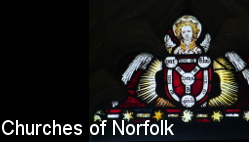
home I index I latest I glossary I introductions I e-mail I about this site
St Margaret, Toft Monks
Follow these journeys as they happen at Last Of England Twitter.
St Margaret, Toft Monks South-east Norfolk has a character all of its own. The busy roads from Beccles to Norwich and Yarmouth thread through without so much as a glance at the sprawling landscape, and so it is left to the jinking lanes to narrow and then disappear into the low-lying marshes of the Yare and the Waveney. The villages are small and so are the churches, many of them sitting on their own, their churchyards hedged by fields, copses and reed beds. The parish church of Toft Monks is externally a little grander than some of its more humble neighbours. As is common around here it is essentially a Norman church with the addition of a later tower, in this case octagonal in plan. However, as Pevsner points out, there seems to be more going on here than meets the eye, which at first sight is a 13th Century tower with a 15th Century crown. But the tower arch has Norman imposts, and there are round-headed arches set in the wall above and a circular plan to the tower internally, so this was originally a Norman round tower, perhaps as early as the 11th Century, later encased to make it octagonal, presumably for reasons of fashion. 13th Century octagonal bell stages are common on East Anglian round towers, but towers which are polygonal from the ground up are somewhat rarer. The chancel was rebuilt at the same time as the encasing of the tower, the Perpendicular windows in the nave presumably contemporary with the tower's crowning. I had not been back to Toft Monks for fifteen years, and since then I'm afraid the lead of the porch roof with its churchwarden's names incised in it which I saw then has been stolen. Still, today the porch looks smart with its new red tiles, and there remain the curious carved wooden corbel heads, grinning widely and made more grotesque by their weathering. There are similar heads in the porches at Metfield and Thwaite in Suffolk. The nave feels larger inside than it actually is, thanks to the proportions of width to length , the tall windows and the lack of coloured glass, except for one very good exception, the east window of 1952 designed by Thomas Derrick. It depicts Christ in Majesty above the symbols of the four evangelists, and the signature tells us that it was made by Gilbert Sheedy at South Weston, Oxon 1952. Turning back to the west, the wall is a busy curiosity. As well as the Norman tower arch made pointed with its three round-arched openings above it, one beside the other and the third above them, there are two more smaller round-headed windows set against the south and north walls. There is something similar at the ruined church at Oxwick way across on the other side of Norfolk. The roof appears old, but its wall posts overlap the 15th Century windows as if the wall has been cut away behind them, and the top round-headed opening into the tower (a sanctus bell window?). There are a couple of memorials up in the chancel, the most curious of which is to John and Elizabeth Bayspoole of 1653. It appears to be incomplete, for the prayerdesk at the bottom has no figures facing across it. Above it is a monument of 1789 to John Loddington, Thirty Eight Years Rector of this Parish with Haddiscoe. It also remembers his father Isaac who had died ten years previously, and at the bottom we are told that this Monument was Erected by the Children of the above John Lodington in pious Remembrance of their revered Parent. Three
similar brass inscriptions with just four years between
them may suggest that they were made at the same time,
although the lettering suggests they may have been made
by two different people. Two of them are set in front of
the sanctuary, Edward Howlett, dying in 1607, reminds us
that As I was so are yee, as I am yee shall be, Outside in the churchyard, Henry Fryer dying in 1850 had no such theological quibbles. His headstone to the south-east of the chancel proclaims from the Book of Revelation, in booming tones perhaps, I heard a voice from heaven saying unto me, Write, From henceforth, blessed are the dead which die in the Lord: Even so, saith the Spirit: for they rest from their labours. Simon Knott, November 2021 Follow these journeys as they happen at Last Of England Twitter. |
|
|||||||||||||||||||||||||||||||||||||||||||||||||||||||
home I index I latest I introductions I e-mail I about
this site I glossary
Norwich I ruined churches I desktop backgrounds I round tower churches
links I small
print I www.simonknott.co.uk I www.suffolkchurches.co.uk